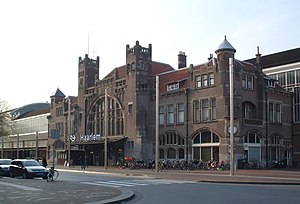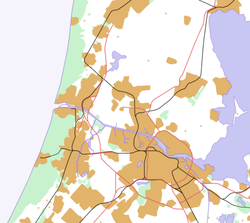Haarlem railway station
|
Haarlem
|
||||||||||||||||||||||||||||||||||||||||
|---|---|---|---|---|---|---|---|---|---|---|---|---|---|---|---|---|---|---|---|---|---|---|---|---|---|---|---|---|---|---|---|---|---|---|---|---|---|---|---|---|

Main entrance, built in the 1900s
|
||||||||||||||||||||||||||||||||||||||||
| Location | Netherlands | |||||||||||||||||||||||||||||||||||||||
| Coordinates | 52°23′16″N 4°38′20″E / 52.38778°N 4.63889°ECoordinates: 52°23′16″N 4°38′20″E / 52.38778°N 4.63889°E | |||||||||||||||||||||||||||||||||||||||
| Operated by | Nederlandse Spoorwegen | |||||||||||||||||||||||||||||||||||||||
| Line(s) |
Amsterdam–Rotterdam railway Haarlem–Uitgeest railway Haarlem–Zandvoort railway |
|||||||||||||||||||||||||||||||||||||||
| Platforms | 6 | |||||||||||||||||||||||||||||||||||||||
| Other information | ||||||||||||||||||||||||||||||||||||||||
| Station code | Hlm | |||||||||||||||||||||||||||||||||||||||
| History | ||||||||||||||||||||||||||||||||||||||||
| Opened | 20 September 1839 | |||||||||||||||||||||||||||||||||||||||
|
||||||||||||||||||||||||||||||||||||||||
| Location | ||||||||||||||||||||||||||||||||||||||||
Haarlem railway station is located in Haarlem, the Netherlands. The station opened at September 20, 1839 on the Amsterdam–Rotterdam railway, the first railway line in the Netherlands. The station building itself is a rijksmonument.
The first, wooden station was built on the Oude Weg, just outside the Amsterdamse Poort in 1839 to accommodate the passengers of the first railway in the Netherlands between Haarlem and Amsterdam, which had a broad gauge rail width of the Dutch broad gauge 1,945 mm (6 ft 4 9⁄16 in). The station was built outside the city, on the current location of the Centrale Werkplaats (maintenance depot) of the Hollandsche IJzeren Spoorweg-Maatschappij. At great expense, the rail width was later reduced to 1.435 metres (4 ft 8 1⁄2 in) in order to conform to George Stephenson's standard gauge. The train engine "De Snelheid" was the twin of the Amsterdam "Arend", which along with the carriages, were designed by Stephenson's apprentice, the English rail engineer Thomas Longridge Gooch of R.B. Longridge & Co. There were 4 trains per day to Amsterdam, scheduled at 9:00, 14:00, 16:00, and 18:00. The prices of the tickets for 1st (closed carriage), 2nd, and 3rd class (char-à-banc) were 1.20, 80c, and 40c (guilders).
...
Wikipedia

